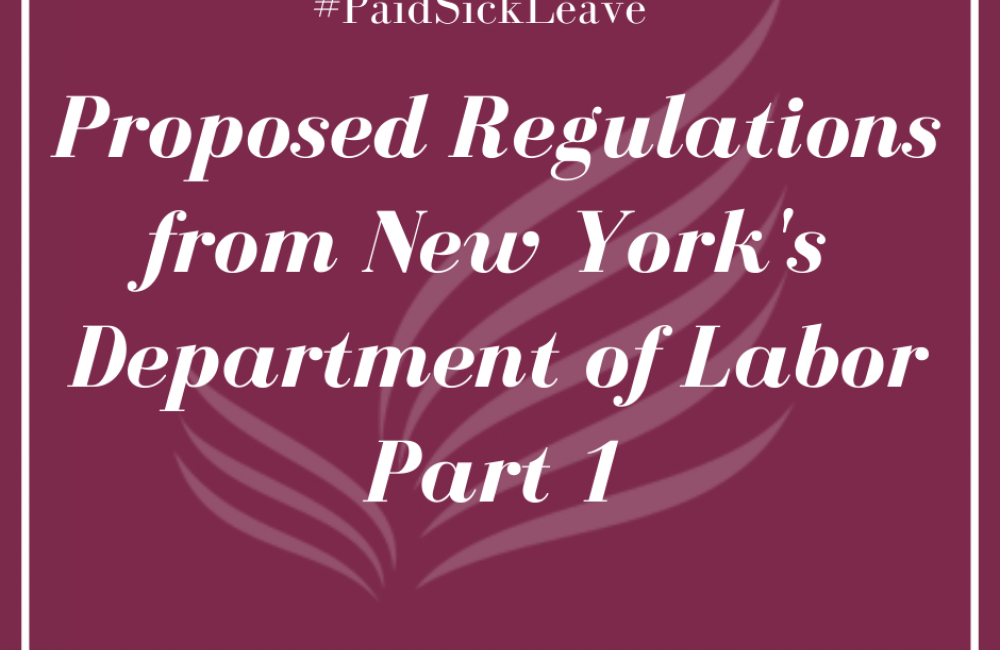We previously reported on New York’s enactment of Paid Sick Leave (“PSL”), for which accruals began on September 30, 2020 and become available for employees to use beginning January 1, 2021. More recently, we reported on the guidance New York issued in October 2020 surrounding PSL.
On December 3, 2020, the New York State Department of Labor (DOL) posted proposed regulations in relation to PSL. The proposals are still subject to the formal notice and comment rules that all state and federal regulations must adhere to, but they give us a glimpse into what the DOL intends to formally publish.
Definitions. The DOL plans to define many PSL terms, ostensibly to provide clarity. Most refer to other laws, using already-known definitions. However, confidential information – which employers are prohibited from seeking – is specifically defined in the context of PSL as:
[I]ndividually identifiable health or mental health information, including but not limited to, diagnosis and treatment records from emergency services, health providers, or drug and alcohol abuse prevention or rehabilitation centers. Confidential information also means information that is treated as confidential or for which disclosure is prohibited under another applicable law, rule, or regulation.
Documentation. The DOL intends to allow employers to require at least some underlying evidence of the employee’s need for PSL – but only when an employee uses PSL for three or more consecutive workdays. As we previously reported, however, employers can’t ask for the nature of the illness or the reason why the employee needs to use PSL.
So what can an employer do? First, it’s allowed to obtain documentation from a licensed medical provider who states that PSL is needed, the amount of time needed, and a return to work date. Alternatively, it can require an “attestation from an employee” of their need for PSL. An attestation requires the employee to swear – presumably under oath – that they’re taking PSL for a covered purpose and may face discipline if they’re lying.
Counting Employees. As you’ve seen in our past guidance, the number of PSL days an employer must provide depends on the size of its workforce. Before the proposed regs, we didn’t know which employees would be included in the count. If the regs are promulgated as proposed, the employee count is the “highest total number of employees concurrently employed at any point.” For example, if an employer has 50 employees in New York and 50 employees in Pennsylvania, for purposes of PSL, it has 100 employees and must provide its New York employees with 56 hours of PSL annually.
Part-time workers are counted as employees for all workdays. An employee who temporarily is out of work must be included in the headcount if the employer has a reasonable expectation that they will return to work. Joint employers must count all employees for purposes of PSL, regardless of whether the employee is on their payroll.
So what happens if a four-employee company (with net income for the previous year under $1 million) hires a fifth employee? Will the PSL need to be paid versus unpaid? Or what if the opposite scenario occurs, where the employer had five employees but now only has four? See our next blog on how employers move from one bracket into another!
Accruals. The DOL’s proposed regulations confirm that all time worked by employees counts towards PSL accrual, even if they work less than 30 hours. Employers can round accruals to the nearest five minutes, one-tenth, or quarter of an hour, so long as rounding doesn’t deprive the employee of accrued PSL over time.
If you have questions on Paid Sick Leave and its corresponding guidance, reach out to a member of our team. We’d be happy to help guide you through the new statute and its guidance, including the newly-published proposed rules. Remember, we’re running businesses too, and we’re here for you.

